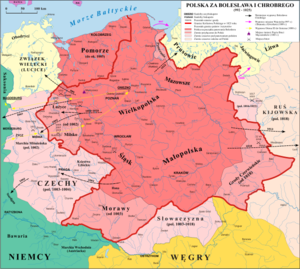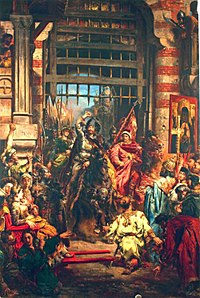Bolesław I's intervention in the Kievan succession crisis: Difference between revisions
fix as per talk |
surely we can find a better source here than a 19th century encyclopedia. As discussed at length elsewhere, using 19th century sources should be avoided. |
||
| Line 24: | Line 24: | ||
The victory paved Boleslaw's way to Kiev. The city, which suffered from fires caused by the Pechenegs' ongoing siege, immediately surrendered upon seeing the main Polish army on [[August 14]].<ref name="Wyprawa10">''Wyprawa Kijowska Chrobrego...'' p.10</ref> The entering forces, led by Boleslaw, were ceremonially welcomed by the local [[archbishop]] and [[Family life and children of Vladimir I|Vladimir's family]].<ref name="Wyprawa10"/> A popular legend related to the history of the [[Polish Crown Jewels|Polish coronation weapon]], the [[Szczerbiec]] sword, is the tale of the [[Golden Gate (Kiev)|Golden Gate of Kiev]], upon which the Szczerbiec was supposedly notched when Boleslaw's entered the city.<ref name="Wyprawa10"/> That legend, however, has no historical proof; the gate was build about 20 years later, and the sword was made 200 years later.<ref name="Wyprawa11"/> |
The victory paved Boleslaw's way to Kiev. The city, which suffered from fires caused by the Pechenegs' ongoing siege, immediately surrendered upon seeing the main Polish army on [[August 14]].<ref name="Wyprawa10">''Wyprawa Kijowska Chrobrego...'' p.10</ref> The entering forces, led by Boleslaw, were ceremonially welcomed by the local [[archbishop]] and [[Family life and children of Vladimir I|Vladimir's family]].<ref name="Wyprawa10"/> A popular legend related to the history of the [[Polish Crown Jewels|Polish coronation weapon]], the [[Szczerbiec]] sword, is the tale of the [[Golden Gate (Kiev)|Golden Gate of Kiev]], upon which the Szczerbiec was supposedly notched when Boleslaw's entered the city.<ref name="Wyprawa10"/> That legend, however, has no historical proof; the gate was build about 20 years later, and the sword was made 200 years later.<ref name="Wyprawa11"/> |
||
Historians are divided on whether Boleslaw then decided to rule Kievan lands himself or not;<ref name="Wyprawa10"/> but it is certain that he occupied the city for a few months, collecting a significant contribution, which he divided among his allies.<ref name="Wyprawa10"/> The wide-scale pillaging of the Polish troops caused a massive uprising among Kievan citizens |
Historians are divided on whether Boleslaw then decided to rule Kievan lands himself or not;<ref name="Wyprawa10"/> but it is certain that he occupied the city for a few months, collecting a significant contribution, which he divided among his allies.<ref name="Wyprawa10"/> The wide-scale pillaging of the Polish troops caused a massive uprising among Kievan citizens {{cn}} and Boleslaw was forced to leave the city. Boleslaw had demanded that Yaroslav return his daughter, whom he had taken prisoner to Novgorod. In revenge for Yaroslav's refusal, Boleslaw took members of his family prisoner when he returned to his Polish lands in September; his notable captives included Vladimir's widow and his daughter Predslava, whom he took as a [[concubine]].<ref name="Wyprawa10"/> As Gallus has it, the war started when Boleslaw was refused Predslava's hand, but this testimony is not given credit by most historians. The Polish duke also took the treasury of Kiev with him. |
||
According to Thietmar the prize taken during the campaign was given as a votive offering to Anastasius of [[Korsun]], a dean of the [[Church of the Tithes]], who later took these spoils with him to Poland. Boleslaw himself retained a number of notable captives.<ref name="Wyprawa10"/> |
According to Thietmar the prize taken during the campaign was given as a votive offering to Anastasius of [[Korsun]], a dean of the [[Church of the Tithes]], who later took these spoils with him to Poland. Boleslaw himself retained a number of notable captives.<ref name="Wyprawa10"/> |
||
Revision as of 21:40, 4 September 2007
The Kiev Expedition (Polish: Wyprawa kijowska; Russian: Польское вторжение) was an episode in the struggle for Kievan Rus' between Sviatopolk I and his brother Yaroslav I the Wise, where Sviatopolk's father-in-law, Duke Boleslaw the Brave of Poland, intervened on behalf of Sviatopolk, defeated Yaroslav's armies, and temporarily secured the throne for Sviatopolk.
Background


Between 1005 and 1013, Sviatopolk married a daughter of Boleslaw I of Poland; her name has not survived in sources.[1] His father, Grand Duke Vladimir I of Kiev, later chose his younger sons, Boris and Gleb, as successors; despite being the eldest son, Sviatopolk was imprisoned by Vladimir in 1013.[1] Boleslaw, wanting to ensure that his ally, Sviatopolk, took over the Kievan throne, invaded Kiev's lands that year; little is known about that event aside from Vladimir's release of Sviatopolk from imprisonment.[1]
After Vladimir's death in 1015, Boris and Gleb were soon murdered and Sviatopolk fought with Yaroslav for control of their homeland. Sviatopolk lost, and having been expelled from Kiev by Yaroslav and his Novgorodian adherents, Sviatopolk withdrew to the court of his father-in-law, Boleslaw I.[1] The Polish duke proposed a marriage of himself to one of the late Vladimir's daughters, Predslava, but was refused.[2] After securing Poland's western border with the Holy Roman Empire through the Treaty of Bautzen, Boleslaw was ready to again support Sviatopolk with his military might.[2]
The expedition
Much about the Bolesław's expedition is known from a chronicle by Thietmar of Merseburg, who supposedly obtained detailed information about Boleslaw's Kievan campaign from Sviatopolk himself.
The druzhina (army) of Boleslaw, aided by German and Hungarian mercenaries, crossed the borders in 1018 and reached Kiev later the same year. His army size is estimated at between 2,000-5,000 warriors, including 100 Pechenegss, 300 German knights, and 500 Hungarian mercenaries.[3] Less is known about Yaroslav's army, but its size is estimated as on par with Bolesław's forces; it is also certain that he was aware of Boleslaw's intentions and had time to gather his forces in defense.[3] After concentrating his forces in June, in the following month Boleslaw's troops reached the border - the banks of the River Bug, near the settlement of Wołyń.[3] In the meantime, Boleslaw's Pecheneg allies approached Kiev, forcing Yaroslav to detach a part of his forces to ensure the safety of his capital.[3] Yaroslav, in turn, wanted to prevent Boleslaw from uniting with the Pechenegs, defeat his main force before it entered and ravaged Kiev, and then take care of the less organized Pechenegs.[3]


Both armies met on the opposite banks of the River Bug.[3] Yaroslav's forces took position with archers covering the crossing points; Bolesław took his time, allowing his army to rest, and started work on makeshift bridges.[3] The Battle at Bug river finally occurred around July 23.[4] According to the Polish chronicler Gall Anonim, the battle occurred by accident: When Boleslaw decided to throw a feast to boost morale of his army, Yaroslav's archers and scouts decided to create trouble for the Polish servants who were gutting the animals and preparing them near the river. However, they only annoyed them enough that the servants themselves crossed the relatively shallow river and chased Yaroslav's surprised advance troops away.[4] Bolesław learned of this sooner then Yaroslav, and managed to move most of his army across the river, engaging the surprised Yaroslav, who did not manage to consolidate his stretched army timely; Yaroslav's army shattered quickly.[4]
A Russian chronicle, Powiesc Doroczna gives a slightly different version of events, however, one in which both armies were combat ready across the river, and Boleslaw, enraged by insults from across the river, charged with his army forth, surprising Yaroslav that way.[4] Most modern historians support Gall Anonim's version, and all agree that after a short battle the Polish prince was victorious, scoring a major victory.[4] Yaroslav survived the battle, but retreated to Novgorod, not Kiev - likely suspecting that he lacked enough strength to defend Kiev, which was besieged by the Pechenegs and had significant pro-Sviatopolk faction inside.[4]

The victory paved Boleslaw's way to Kiev. The city, which suffered from fires caused by the Pechenegs' ongoing siege, immediately surrendered upon seeing the main Polish army on August 14.[5] The entering forces, led by Boleslaw, were ceremonially welcomed by the local archbishop and Vladimir's family.[5] A popular legend related to the history of the Polish coronation weapon, the Szczerbiec sword, is the tale of the Golden Gate of Kiev, upon which the Szczerbiec was supposedly notched when Boleslaw's entered the city.[5] That legend, however, has no historical proof; the gate was build about 20 years later, and the sword was made 200 years later.[6]
Historians are divided on whether Boleslaw then decided to rule Kievan lands himself or not;[5] but it is certain that he occupied the city for a few months, collecting a significant contribution, which he divided among his allies.[5] The wide-scale pillaging of the Polish troops caused a massive uprising among Kievan citizens [citation needed] and Boleslaw was forced to leave the city. Boleslaw had demanded that Yaroslav return his daughter, whom he had taken prisoner to Novgorod. In revenge for Yaroslav's refusal, Boleslaw took members of his family prisoner when he returned to his Polish lands in September; his notable captives included Vladimir's widow and his daughter Predslava, whom he took as a concubine.[5] As Gallus has it, the war started when Boleslaw was refused Predslava's hand, but this testimony is not given credit by most historians. The Polish duke also took the treasury of Kiev with him.
According to Thietmar the prize taken during the campaign was given as a votive offering to Anastasius of Korsun, a dean of the Church of the Tithes, who later took these spoils with him to Poland. Boleslaw himself retained a number of notable captives.[5]
Aftermath
Sviatopolk lost the throne soon afterwards and his life the following year.[6] As Boleslaw was involved in an important conflict with Holy Roman Emperor Henry II, he did not intervene on behalf of his son-in-law again and instead signed a pact with Yaroslav.
Although he lost control of Kiev, Boleslaw succeeded in keeping the Cherven Towns, which had been captured by Vladimir the Great in 981. [6] In 1025, Boleslaw was crowned King of Poland.[6] Yaroslav outlived Boleslaw and contributed greatly to the strengthening of Kievan Rus'.[7] One of his achievements was the reconquest of Red Ruthenia.
See also
Reference
- ^ a b c d Wyprawa Kijowska Chrobrego... p.6
- ^ a b Wyprawa Kijowska Chrobrego... p.7
- ^ a b c d e f g Wyprawa Kijowska Chrobrego... p.8
- ^ a b c d e f Wyprawa Kijowska Chrobrego... p.9
- ^ a b c d e f g Wyprawa Kijowska Chrobrego... p.10
- ^ a b c d Wyprawa Kijowska Chrobrego... p.11
- ^ Wyprawa Kijowska Chrobrego... p.12
Further reading
- Wyprawa Kijowska Chrobrego Chwała Oręża Polskiego Nr 2. Rzeczpospolita and Mówią Wieki. Various authors and editors. 5 August 2006 Template:Pl icon
- Рыжов Константин (1999). Все монархи мира: Россия: 600 кратких жизнеописаний (in Russian). Москва: Вече. pp. 636 pages. ISBN 5-7838-0268-9. Template:Ru icon
